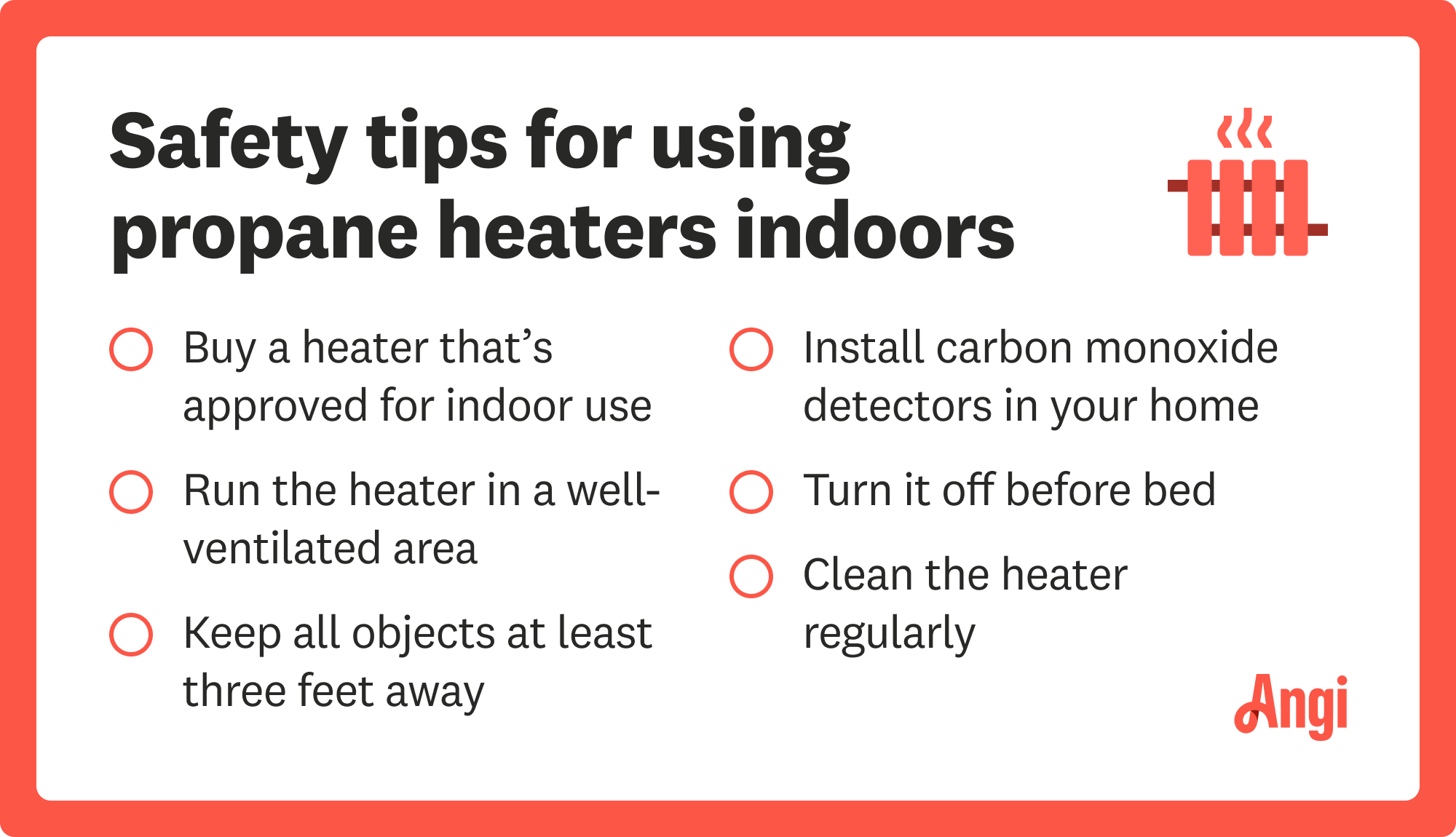
Gas furnace replacement costs depend on the type of furnace you want and installation fees. Our guide explains all the factors involved in a new furnace cost.
While propane heaters come with some inherent risks, certain types of propane heaters are safe to use indoors


If you take the proper precautions, it's safe to use certain propane heaters indoors.
However, there are some risks involved with running propane heaters inside.
Carbon monoxide poisoning and fire are two of the biggest dangers.
To stay safe, turn the heater off before bed and keep it clean.
You should also keep kids, pets, and household objects away from the heater.
Propane heaters are a great way to banish winter chills and stay warm indoors and out. But you may be wondering about their safety risks and for good reason. While propane leaks can cause fires and carbon monoxide poisoning if undetected, indoor propane heaters are safe to use if you exercise caution. We’ve broken down everything you need to know.

In practice, propane heaters work in much the same way as natural gas-powered heaters, except that they use propane as fuel instead of natural gas. Propane is stored as a liquid in a propane tank, which is then attached to the heater. Propane is then converted into a gas and burned to generate heat.
Like natural gas, using propane to heat your home comes with a small amount of risk, including the possibility of carbon monoxide poisoning and fire. So, are propane heaters safe for indoors?
If you use your heater properly, propane is a relatively safe way to heat your home. Some homes are even heated entirely using propane. You can also use propane heaters outside to make your outdoor living space cozier during cool temperatures.

Before you buy a heater to warm up your home, make sure you understand what propane heaters are safe to use indoors. (Hint: It’s pretty straightforward.) Indoor propane heaters, which are designed to be used, as their name suggests, indoors, are safe to use inside your home. On the other hand, you should never use an outdoor propane heater inside.
Indoor propane heaters have an automatic shutoff mechanism that turns the heater off if too much carbon monoxide or carbon dioxide accumulates, while outdoor propane heaters do not have that feature. You can still use outdoor propane heaters outside in an area with good air circulation.
Are indoor propane heaters safe? Yes, but there are some risks involved, including fire and carbon monoxide poisoning.
Like natural gas, burning propane releases carbon monoxide, which can cause deadly carbon monoxide poisoning. Carbon monoxide is colorless and odorless, so it can be difficult to detect carbon monoxide poisoning until it’s too late. That’s why it’s essential to have working carbon monoxide detectors in any house, especially one that’s heated using propane.
You should install working carbon monoxide detectors on every floor of your house, particularly near bedrooms, and test them regularly.
Propane is also extremely flammable. If there’s a leak in your propane tank, there’s a serious risk that a fire could break out in your home. Because propane is heavier than air, it tends to sink to the ground, stick in the nooks and crannies of your home, and can be ignited by flames, sparks, or even static electricity.
Before you can enjoy the toasty-warm heat your new propane heater provides, there are some safety tips you should know.
Make it a practice to shut the heater off before going to bed.
Keep kids, pets, and household items three feet away from the heater at all times.
Do not store items on top of the heater.
Avoid spraying hair spray, aerosol sprays, or perfume in the room where the heater is in use or was recently in use.
If your heater has a weird smell, turn it off immediately and contact a furnace repair person in your area.
Clean your heater regularly to keep it working properly.
Margaret Wack contributed to this article.
From average costs to expert advice, get all the answers you need to get your job done.

Gas furnace replacement costs depend on the type of furnace you want and installation fees. Our guide explains all the factors involved in a new furnace cost.

What you’ll pay in Columbus, OH, for furnace repairs depends on many factors. Here’s a breakdown of what can go wrong and the cost to fix those issues.

Inspections are an essential part of furnace maintenance. Prevent inconvenient breakdowns by budgeting for furnace inspection costs and repairs.

Learn how to reset your boiler safely with our comprehensive guide. Don't let heating issues disrupt your comfort this winter.

Your return air vent is responsible for removing warmer air, so testing it ensures you keep your environment comfortable and there are no HVAC problems.

Don't get left out in the cold. These warning signs can help you determine whether you need to replace your heating system to keep you cozy all season long.